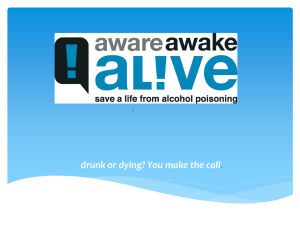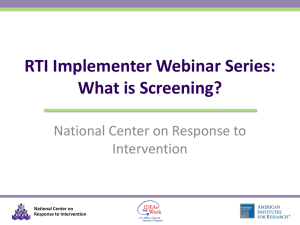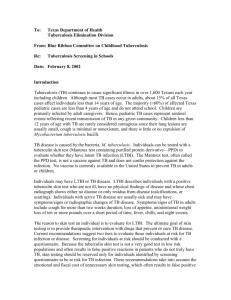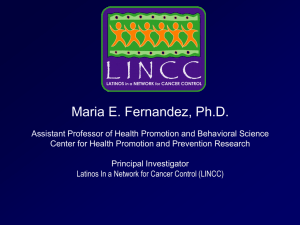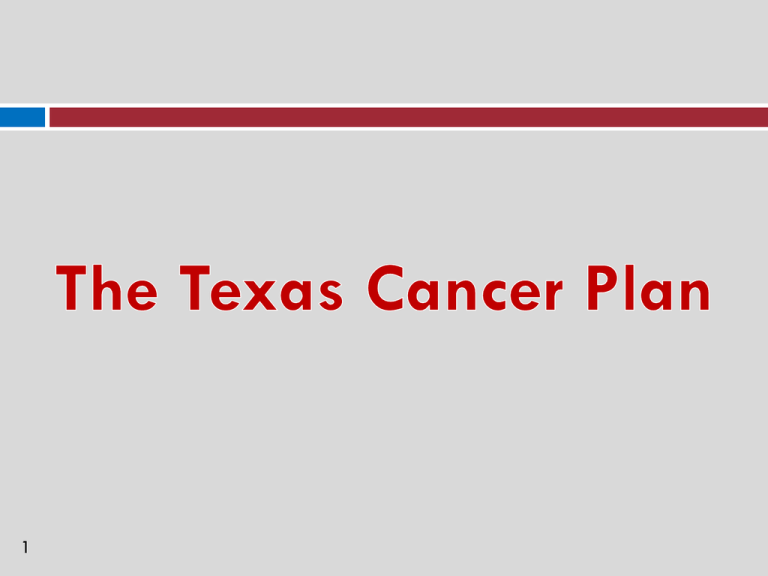
1
State Cancer Plans
2
Every state has a cancer plan
Texas had one of 1st state plans
Focus of state plans is on cancer prevention and
control; guides efforts of stakeholders and
communities
Revision of 2005 Texas Cancer Plan adds a section
on research and commercialization, but retains
original focus of cancer prevention and control
Texas Cancer Plan
The primary purpose of
the Texas Cancer Plan
is to guide and
influence the priorities
and activities in cancer
research, prevention
and control of all
stakeholders in Texas
3
The Cancer Prevention & Research
Institute of Texas (CPRIT)
4
CPRIT has statutory
responsibility for
facilitating the
development of the
Plan and supporting its
implementation.
Success of the Plan will
depend on many
stakeholders
Texas Cancer Plan Revision Process
Oct 2010
Jan–May
2011
Jun-Aug
2011
Sept– Jan
2011
Mar-Apr
2012
5
• Call for Work Group Nominations
• Work Group Meetings, Drafting Process
• Open Comment Period
• Revise and Present to CPRIT Oversight Committee
• 2012 Texas Cancer Plan Approval and Release
Overview
The 2005 Plan was significantly revised and the new
Plan now includes:
16
Specific Goals
Measureable objectives with baseline and targets
developed wherever possible
List of strategic actions for implementation
Research and Commercialization section
Call to Action section
6
Table of Contents
7
Executive Summary
Introduction
Continuum of Cancer
Research, Prevention, and
Control: brief overview of
6 major areas
Goals, Objectives, Strategic
Actions
Appendices
Priority Areas for 2012-2016
Increase
opportunities to
access and
participate in
clinical trials
Decrease
tobacco initiation
and use and
exposure to
secondhand
smoke
Increase
screening and
early detection
for breast,
cervical, and
colon and
rectum cancers
Reduce cancer
health
disparities
8
Reduce pain and
suffering from
cancer through
coordinated
supportive care
9
Call to Action
What can YOU do?
10
If you are a hospital
11
Ensure that your cancer cases are reported in a
timely manner.
Collaborate to sponsor navigation and survivorship
programs.
Collaborate to sponsor community screening and
education programs.
Seek or maintain accreditation through American
College of Surgeons, The Joint Commission, etc.
Implement tobacco-free policies at your facility.
If you are a local health department
12
Support policy, environmental, and systems changes
for cancer control.
Provide cancer prevention awareness information
and screening programs to citizens.
Provide navigation services for clients.
Collaborate in community prevention campaigns.
Work with physicians to promote screening
programs and case reporting.
If you are a community-based
organization
13
Support policy, environmental, and systems changes
for cancer control.
Provide cancer prevention awareness information
and screening programs for clients.
Provide navigation services for clients.
Encourage participation in clinical trials.
Collaborate to provide community prevention
programs.
If you are an employer
14
Seek or maintain CEO Cancer Gold Standard™
accreditation.
Implement tobacco-free policies at your facility.
Provide healthy foods in vending machines and
cafeterias.
Encourage employees to increase physical activity.
Collaborate with hospitals to host screening events.
Use reminders and implement programs (i.e., paid time
off for screenings, bringing screenings to the worksite)
to reduce barriers and to encourage employees to have
regular cancer screenings.
If you are a school/university
15
Include cancer prevention messages in health classes.
Provide healthy foods in vending machines and
cafeterias.
Increase physical education requirements.
Make your entire campus a tobacco-free environment.
If you are a faith-based organization
16
Provide cancer prevention information to members.
Learn how to provide healthy potlucks and meeting
meals.
Provide space for physical activity programs.
Encourage members to get cancer screening tests on
time.
If you are a physician
17
Provide culturally relevant counseling, information, and
referrals for cancer screening tests.
Adhere to guidelines and best practices for prevention,
treatment, and supportive care.
Refer patients to smoking cessation, physical activity,
and nutrition programs.
Be sure your cancer cases are reported in a timely
manner.
Find out how to enroll patients in clinical trials.
Make appropriate referrals to hospice for end-of-life
care.
If you are a legislator
18
Raise constituents’ awareness about cancer
prevention and control programs in your district and
help establish new programs where needed.
Sponsor or support legislation and funding that
promotes cancer research, prevention, and control.
Ensure that all Texans have access to health care
and to screening and early detection services.
Ensure that tobacco settlement funds are used for
reducing tobacco use and for cancer control
purposes.
If you are a Texan
19
Stop using tobacco products or never start.
Eat more fruits and vegetables and maintain a healthy
weight.
Increase your daily physical activity.
Know when to be screened and do it on schedule.
Support comprehensive tobacco-free environment policies.
If diagnosed, consider enrolling in a clinical trial.
Show your support and care for those who are diagnosed.
Volunteer with your hospital, health department, faith
community, or local community-based organization.
txcancerplan.org
2012 Texas Cancer
Plan (PDF)
1-page Plan
Overview (PDF)
Plan powerpoint
20
Call to Action
What can YOUR organization do
to help implement the Texas
Cancer Plan?
21
Questions?
22





